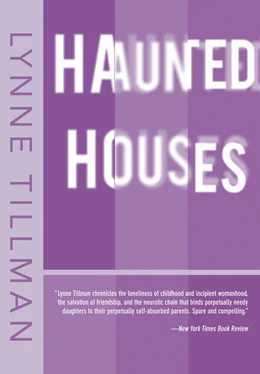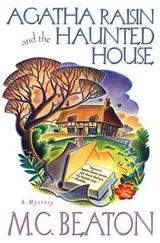Lynne Tillman - Haunted Houses
Здесь есть возможность читать онлайн «Lynne Tillman - Haunted Houses» весь текст электронной книги совершенно бесплатно (целиком полную версию без сокращений). В некоторых случаях можно слушать аудио, скачать через торрент в формате fb2 и присутствует краткое содержание. Год выпуска: 2011, Издательство: Red Lemonade, Жанр: Современная проза, на английском языке. Описание произведения, (предисловие) а так же отзывы посетителей доступны на портале библиотеки ЛибКат.
- Название:Haunted Houses
- Автор:
- Издательство:Red Lemonade
- Жанр:
- Год:2011
- ISBN:нет данных
- Рейтинг книги:5 / 5. Голосов: 1
-
Избранное:Добавить в избранное
- Отзывы:
-
Ваша оценка:
- 100
- 1
- 2
- 3
- 4
- 5
Haunted Houses: краткое содержание, описание и аннотация
Предлагаем к чтению аннотацию, описание, краткое содержание или предисловие (зависит от того, что написал сам автор книги «Haunted Houses»). Если вы не нашли необходимую информацию о книге — напишите в комментариях, мы постараемся отыскать её.
, Tillman wries of the past within the present, and of the inescapability of private memory and public history. A caustic account of how America makes and unmakes a young woman.
Haunted Houses — читать онлайн бесплатно полную книгу (весь текст) целиком
Ниже представлен текст книги, разбитый по страницам. Система сохранения места последней прочитанной страницы, позволяет с удобством читать онлайн бесплатно книгу «Haunted Houses», без необходимости каждый раз заново искать на чём Вы остановились. Поставьте закладку, и сможете в любой момент перейти на страницу, на которой закончили чтение.
Интервал:
Закладка:
The Infanta never really had a mother, unless you count a woman dying for six months as your mother. Grace thought of Ellen in the mental hospital, and how she didn’t really have a mother, either. It was when Ellen called Grace mother that Grace decided to quit that job because, as she told Mark, I’d only end up hurting her. They said goodbye when Ellen was lucid, but Ellen couldn’t understand that it was goodbye forever. She touched Grace’s hair and for the first time in Grace’s life she was moved to sadness for someone else. It made her feel impotent, then angry, that big empty feeling. No one loved her, Ellen, or the Infanta. And it’s your right to be mean or crazy, “The King didn’t even stay with the Infanta on her birthday,” Grace complained. “He was busy taking care of the state,” Mark teased. Even though he’d said she wouldn’t have to memorize anything, the Infanta’s role was growing and Grace was beginning to think that Mark should play it. “I’ll never learn it all.” “Ah, you’re a natural,” he said. And she said, “When I hear that word, I want to dye my hair black.”
Late at night Grace couldn’t memorize her lines and stared into space and then out the space through the window. The empty streets had a ghostliness that was part of night, and there wasn’t anything necessarily worse about the night than the day, except for the darkness, which was only natural. The day dyes its hair, too, she thought, that’s why it’s weird and why I like it, even if it’s scary. Under cover of night. The dark. The guy at the bar talking about those murders in Providence. A man stalking women, one after another. Mark and she had been arguing about the end of the Dwarf, his death, and whether or not he had to die, or if it could end differently. Grace said he had to die, and Mark thought maybe he could be put on a respirator and the Infanta forced to confront the consequences of her actions before he died. But then you couldn’t use the last line, Grace argued, and that’s when the guy at the bar yelled at them about just talking about death like that when real people were being killed, not storybook dwarfs, and who cares anyway, and Mark talked about wanting to give people hope and the guy said he was hopeless, just another artist. “Real murders take place in the real world,” he yelled. “What’s real?” Mark yelled back. Later in her room Grace wasn’t convinced about anything. He said real murder in a menacing way. Real murder committed by real people out there. Out there. “Or even in here,” the guy added. Mark was sure he was a cop, undercover, bent on scaring the demimonde. There’s épater le bourgeois and there’s épater la scum. Dying of a broken heart is different from being murdered, and she doubted that anyone really died because of love. It seemed so stupid.
After the Dwarf and the Infanta, the flowers had the biggest parts. Carmen, a transsexual, wanted to be either a violet or a tulip, but because of expediency, she would play all the flowers, in one. She can make her own costume, Mark said, anything she wants. “The flowers are vicious little snobs,” Carmen said, preparing to recite her lines: “He really is too ugly to be allowed to play anywhere we are.” “He should drink poppy juice and go to sleep for a thousand years.” “He is a perfect horror, and if he comes near me, I will sting him with my thorns.” In Wilde’s story the violets don’t actually speak but reflect that the Dwarfs ugliness is ostentatious and he would have shown much better taste if he had just looked sad. Carmen said Wilde was right, ugliness does look like misery and Grace said he wasn’t saying that. And Mark said he was saying that the reason the Dwarf was despised was because his imperfections made him stand out, and given his lowly origins, he’s supposed to be invisible.
It adds up, it doesn’t add up. The flowers are snobs, and they’re part of nature, but then so is the Dwarf, whom they disdain. Ugliness is kind, beauty is cruel, yet the Dwarf also succumbs to the beauty of the Infanta, because beauty is always beyond reproach, innocent. “Can beauty be innocent and cruel at the same time,” Grace wondered aloud to Mark. “Maybe,” Mark said, “beauty is as ambiguous as evil and ugliness and innocence.” Grace told Mark that she had the feeling that getting old means that you’re taken over and forced to forget your innocence. Mark couldn’t believe that Grace thought of herself as innocent. She said she wasn’t talking about sex, and what had that got to do with innocence anyway. To Grace, innocence meant the time before time counted, when days were long, when summer stretched ahead of you as a real long time and you could do nothing and that was all right. The time she went to summer camp and it seemed like forever. Innocence meant not seeing how ugly things were. Innocence meant that you think of yourself as doing the right thing, even if it looked wrong. Innocence meant you were never going to die and no one you loved would either. Innocence meant you’d never grow old because you could not really be touched. Maybe she meant damaged, she couldn’t get damaged. You could still leave, turn away.
“Turn to me,” the guy at the bar said. It was the guy who told Mark he was into pussy. He was back, holding racing gloves in one hand, a drink in another. He had all his fingers and he looked dangerous, like the evil hero in a grade B movie. Grace smiled to herself. More like a character actor than a star, and he thought she was smiling at him. Mark had said if she was so into her innocence, maybe she should play the Dwarf. She kept on smiling and talking drunkenly to the stranger. Mark watched them leave. Carmen said that real girls had it much too easy. He took her to a seedy hotel next to the Greyhound Bus Station, and it was all perfect as far as Grace was concerned, except that there was something about him that she couldn’t put into words. He stayed here from time to time, he said, when he was in town. His leather jacket was worn, his black pants tight, his hands were large and rough, and he had books on the floor, the kind she wouldn’t have expected. Like Nietzsche.
The room was small, with a single electric light bulb hanging from the ceiling, a draft shaking it every once and a while. He had some Jack in the Black in his bag, and they kept on drinking. He didn’t seem to notice the place, and Grace supposed he’d seen worse. Maybe everything. When they made love his large hands moved her body around, positioning it finally on a diagonal across the bed. Her body fit into the old mattress as if into a mold. He hardly kissed her and kept repositioning her body into that same spot. Any excitement she had had fled and she went through the motions with him. Neon lights flashed on and off. The glare from crummy signs made it hard to sleep, and Grace woke, dressed fast, and left his room. He called himself Hunter, his last name, he said. She didn’t wake him.
Grace repeated this story to Lisa, the singer who worked with the band every other week. “Sounds like a pervert,” Lisa said. “A pervert,” Mark exclaimed. “Did you ever see The Naked Kiss ? ‘He gave me the naked kiss, the kiss of a pervert.”’ “Women are much sweeter,” Lisa continued. “Then,” Mark went on, “there’s that line when he asks her to marry him and he says, ‘Our life will be paradise because we are both abnormal.’” Grace ignored Mark as best she could to concentrate on Lisa and the idea of sex with women, at least trying it, and not being able to shake the feeling that being with Hunter was like being with a ghost. She didn’t think he came either, not that it really mattered.
Time, actually the sundial, is taken aback by the Dwarf. But the birds like him because he used to feed them in the forest. The flowers think the birds are awful because well-bred people always stay in the same place, like themselves, they say. And the lizards are tolerant of him. Mark called them humanists. Mark wanted to make the scene in which the Dwarf remembers the forest as paradisaical as possible, given the restrictions of the bar, of course. The forest is his Eden, before his fall, his look into the mirror. That’s everyone’s fall, Grace thought. Grace and Mark couldn’t remember the first time they’d looked into mirrors, and wondered what they’d thought. Little kids see themselves for the first time and somehow figure out that that creature is themselves. The Dwarfs long walk through the palace seeking the Infanta leads him to find himself in the mirror. He finally realizes it’s himself because he’s carrying the rose she gave him after he had performed for her. But the Dwarf is too horrified by his image, just like the flowers. Was his image of himself perfect? Then he sees it’s not true. Grace said she was reminded of when her mother thought she was old enough to be left alone at night and told her that now she was her own baby-sitter. “What’s that got to do with this?” Mark asked. Grace said she didn’t know, it just came to mind.
Читать дальшеИнтервал:
Закладка:
Похожие книги на «Haunted Houses»
Представляем Вашему вниманию похожие книги на «Haunted Houses» списком для выбора. Мы отобрали схожую по названию и смыслу литературу в надежде предоставить читателям больше вариантов отыскать новые, интересные, ещё непрочитанные произведения.
Обсуждение, отзывы о книге «Haunted Houses» и просто собственные мнения читателей. Оставьте ваши комментарии, напишите, что Вы думаете о произведении, его смысле или главных героях. Укажите что конкретно понравилось, а что нет, и почему Вы так считаете.












